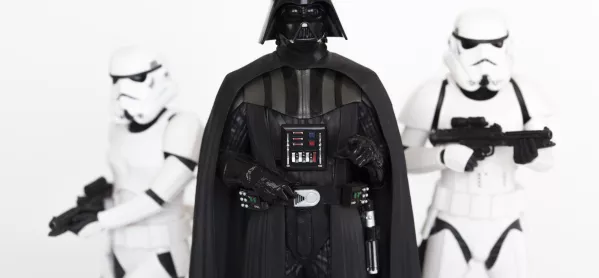- Home
- ‘Isolation booths are bonkers’
‘Isolation booths are bonkers’

The executive principal of special and alternative schools famous for “battering children with kindness” has predicted that in the future people will struggle to accept that pupils were once placed in isolation booths for misbehaving - in the same way as today we struggle to accept that children used to get the cane.
David Whitaker, executive principal of Springwell Special Academy and Springwell Alternative Academy, in Barnsley, is calling on schools that take a zero-tolerance approach to behaviour to look again at such policies in the wake of recent research from the Education Endowment Foundation that shows that “essentially they don’t work”.
In a workshop at Portobello High School’s learning festival in Edinburgh on Saturday, entitled A New Hope: The Star Wars Theory of Behaviour Management, Mr Whitaker said he hoped more schools would now rule with compassion and kindness following the example of Star Wars heroes Princess Leia and Yoda, as opposed to ruling with fear like Darth Vader and Emperor Palpatine.
Research: Say ‘hello’ to tackle pupil misbehaviour
Exclusive: Insiders allege Outwood Grange ‘ritually humiliated’ and ‘terrified’ pupils
Watch: Poem attacking zero-tolerance behaviour policies goes viral
Last week, the EEF published a paper that suggested personalised approaches, such as taking time to greet pupils by name at the classroom door, might be a better way of improving behaviour than introducing universal behaviour systems, which it said were unlikely to work for all pupils.
Behaviour: Zero tolerance ‘doesn’t work’
It also found that there was a lack of evidence for the impact of “zero-tolerance”, or “no-excuses”, behaviour policies.
Mr Whitaker said: “In the early ‘80s you could get the cane and at the time people thought it was OK. It was allowed, wasn’t it? You weren’t breaking the law. You whipped kids, whipped them for doing stuff.
“I often think will we look back in 20 years and say, ‘They used to put kids in booths,’ and everybody will go, ‘No, they never,’ and we’ll talk about putting kids in isolation day, after day, after day.
“I hope that happens because I hope that they stop it and I hope that it doesn’t happen for much longer and that we don’t have to live with that.”
Mr Whitaker said he knew of one zero-tolerance school that had such rigid policies there was an eight-week waiting list for its six isolation booths.
At that school, which he did not name but said served a challenging area, pupils got detention for forgetting equipment like pens. However, getting detentions became so common that the pupils started to ignore them, which automatically led to a day in isolation.
“So the kids were coming to school eight weeks after they had committed the ‘crime’ and somebody was saying to them, ‘You’ve got a day in isolation,’” Mr Whitaker continued.
“It’s bonkers. Because they only had six booths and at one stage they had something like 85 children on the waiting list for isolation, but they still stuck with it because that’s what you do.”
Mr Whitaker argued, though, that schools had a choice. They could rule with fear like the “Galactic Empire Academy Trust” run by arch Star Wars villains Emperor Palpatine, Darth Vader and Grand Moff Tarkin, or they could look to the “Rebel Alliance Academy Trust” for inspiration, with Yoda and Princess Leia at the helm.
Mr Whitaker added: “[Princess Leia] understands, she’s passionate, she’s compassionate. She has empathy. She works really, really hard, and you know what? People respect her and they respect her because she is kind. She is not only kind to the staff, she is kind to the children.
“What she has as well is a really great leadership team and those people around her really understand stuff. They are gurus, they read a lot, they research a lot. They are always learning and they spread that learning to everybody else in their leadership teams.
“That school is starting to become a great school because of the personalities working in it and their approach to working with not only their colleagues but their children.”
Mr Whitaker said that his schools had care teams, not behaviour teams, and they did not use punishments and sanctions but did “loads of other stuff that’s actually much harder than putting a kid in a booth”.
If children were not getting unconditional love and support at home then that gap needed to be plugged by school ,and school needed to be “brilliant”, he said.
“If you go home every night and your dad kicks your head in, is that not enough of a life lesson?” Mr Whitaker asked.
He said he believed in structure, routine and rigour and maintaining standards but when it came to behaviour - just as with maths - children were at different starting points and so you could not take a one-size-fits-all approach.
He said great classroom practice should be in every behaviour policy; teachers should develop expertise in restorative practices; they should explore the reasons why children display challenging behaviour; and schools should deliver high-quality special educational needs and disabilities interventions.
Keep reading for just £1 per month
You've reached your limit of free articles this month. Subscribe for £1 per month for three months and get:
- Unlimited access to all Tes magazine content
- Exclusive subscriber-only stories
- Award-winning email newsletters



